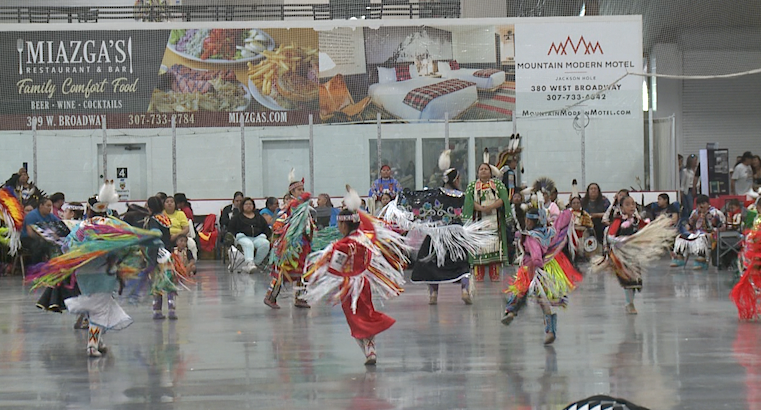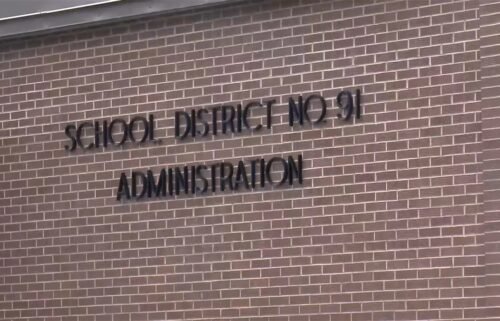The third Annual Teton Pow Wow is a celebration and learning experience for everyone

JACKSON, Wyoming (KIFI)- The third annual Teton Pow Wow was held at the Snow King Event Center in Jackson Friday and Saturday, hosted by the Central Wyoming College and Native American jumpstart. Tribal nations from all over were invited to attend and share their culture, history, and traditions.
"Pow Wow is kind of a more contemporary name. Long ago, the tribes of different nations would gather for different reasons. And some of that included dancing. But today they call it pow wows," said Denise One Star a member of the Oneida and Seneca nations.
Denise says that for, many from the various indigenous nations that come to these Pow Wows can be akin to a large family reunion. "It's important for us to go to powwows just to see our family or friends. We've made a lot of relatives through the pow-wow way of life as well because my husband and I have danced for so long. We look at this or I consider this medicine when we dance, we listen to the song, the singers, their voice is very important to these celebrations and the drum that they sit around, that they say that their spirit is still in that four-legged relative."
She continued, "And so together, the voice, the energy of the singers, and the energy of that drum, that song is what moves us, moves me as a dancer."
Denise says as she dances, she thinks of her family, her ancestors, and the tradition that is involved with the style of dance that she practices. "I do the jingle dress. It's considered a medicine dress, and it comes from the Ojibwe people, and now many tribes throughout Indian country all dance this style of dress. But it's important when we dance, we know the stories and the history that comes with the styles that we dance."
Denise adds that there is also an understood level of respect between the various dances as each style is unique and has a different history, and tradition associated with it.
For Denise and many of her fellow dancers, coming to the Pow Wow gatherings is a reunion. But as a dancer, feels she is an ambassador for her tribe and her people. "I grew up in New York State on the Tonawanda Indian Reservation, my father's Seneca Nation, my mother's Oneida Nation from Wisconsin. I lived all my adult adulthood on the Rosebud Reservation in South Dakota, and I used to always say when I first started dancing I was a shell dancer and when I started dancing, I always said I felt like an ambassador to my people, my longhouse people back home. So wherever I would go to Pow Wow, whichever state I traveled to, I could share my family, my relatives, and my home with the people I met."
Denise says the Pow Wow can also be a learning experience for anyone who witnesses it.
"So people sit there with a good mind and a good heart and they're their ears are open. They can walk away learning a lot about the different dances, the different cultures, and the different people here. So it's the music, it's the songs and the dance that bring us all together."
Denise says that many of the dancers become one big family, and often at a Pow Wow adoption ceremonies are held growing the person's family and giving them many different relatives in tribes all across the country.
The Pow Wow was sponsored by Central Wyoming College and Native American Jump Start. Jennifer Marshall the Executive Director of Marketing says the pow-wow helped get its start, because of the commitment the college has to the education of Native Americans. "We had 44 Native Americans graduate from CWC just this past week, and we're really committed to serving the Wind River Reservation. We have lots of professors that are elders that are here dancing inside right now and students dancing. So it's really about Central Wyoming College's commitment to the Wind River Reservation and Education around American Indian."
The first Pow Wow occurred in 2019 but when the pandemic hit, the Pow Wow couldn't take place. When it returned in 2022, it was an emotional experience for many of the participants Marshall says. "They all came back together after COVID, it was really an emotional experience, as we heard earlier. This is about family. It's about people who haven't seen each other in a long time. Last year was really emotional for a lot of the dancers because they were able to see their family and friends."
Dancers ranged in age from all ages from toddlers to seniors.
Denise says if an observer is moved by the music then they can dance in a respectful manner as well. "Don't go out there upset that circle like, making fun or getting a little bit too rambunctious or whatever. But just go out there and enjoy yourself and that circle is for everyone, you know? But I think when our relatives come out to the center, whether they're native or non-native, they feel that energy. And that's what keeps us going."
Denise is happy to see, so many people, come to the Pow-Wow. "I'm just really grateful to see not just my own people here, but all people, all colors, all races, and enjoying this day to be a part of that. And that's what these are. They're called powwows today, but we call them celebrations. So whatever Jackson Hole, the community here is celebrating the committee that is sponsoring this, powwow we're here to support that. And we do that through song and dance."





